PESHAWAR: Since the Taliban’s takeover of Afghanistan, Pakistan’s offshoot of the hard-line Islamist group has ramped up attacks on its side of the border, leaving Islamabad scrambling to reach a peace deal.
Active in the remote tribal areas of Pakistan, experts say the militant group has been emboldened by the Taliban’s successful ousting of world superpower the United States from Afghanistan.
Tehreek-e-Taliban Pakistan (TTP) — a separate movement which shares a common history with the Afghan Taliban — plunged the country into a period of horrific violence after forming in 2007.
Also made up mostly of ethnic Pashtuns, it carried out hundreds of suicide bomb attacks and kidnappings across the country, seizing control of border regions and imposing a radical version of Islamic law in territory where it held sway.
It was a TTP gunman who opened fire on schoolgirl Malala Yousafzai in her native Swat Valley, before she won the Nobel Peace Prize.
The group was also linked to the assassination of former prime minister Benazir Bhutto.
But it wasn’t until a gun massacre of nearly 150 children at a Peshawar school in 2014 that the military finally crushed the movement and forced its fighters to retreat into Afghanistan.
Now, nearly a decade later and with the Afghanistan Taliban back in control in Kabul, Pakistan is trying to quell a TTP comeback.
“The (fighters) feel more comfortable after the fall of Kabul to the Taliban, they can now move freely in Afghanistan,” a TTP fighter told AFP on condition of anonymity.
“They have no fear of US drone strikes. And they can meet and communicate easily.”
The TTP claimed 32 attacks in August, 37 in September and 24 in October — the highest monthly totals for at least five years, according to their own published data.
Across all of 2020, when the United States first pledged to start withdrawing its troops from Afghanistan, it claimed 149 assaults — three times more than in 2019.
The renewed confidence became apparent in October when the group’s leader Noor Wali Mehsud came out of hiding and was photographed shaking hands with residents and speaking in public — something unimaginable just a few months ago.
More than a dozen Islamist factions have since July 2020 rallied under his leadership.
In an attempt to improve the TTP’s image and distinguish them from the Islamic State’s extremism, Mehsud has largely taken the group in a new direction — sparing civilians and ordering attacks only on security and law enforcement officials.
Recent attacks have been far less deadly than the mass casualty bombings that once terrorized the country.
For Islamabad, part of the strategy to keep the threat of the TTP at bay is by accommodating them.
Past midway in his first term, Prime Minister Khan is keen to shore up support from Pakistan’s conservative base, and rapprochement with groups such as the TTP will appeal to rural voters even while angering the military.
Khan announced in October that the government was in talks with the TTP for the first time since 2014, facilitated by Afghanistan’s new leaders.
Both sides have announced a truce until at least December 9, while they hammer out an agreement.
“Those people who want to come back and respect our law and constitution, we would like to give them a second chance,” said Fawad Chaudhry, Pakistan’s information minister.
Neither side has openly divulged details about the negotiating points.
The release of about 100 TTP fighters was a key demand for the militants to agree to a cease-fire, a source from the group told AFP.
The fighters are also appealing to be able to come out of hiding and return to the tribal areas. But without the support of elders — hundreds of whom have been killed over the years — any deal risks being meaningless.
“It will be difficult for them to return without laying down arms because they have enemies there, they have killed people,” Baadshah, a tribal elder, told AFP in Peshawar.
“They have grudges against the Taliban. But they are ready to accept them unwillingly if it solves the problem,” he added.
Chaudhry has said those affected by the bloody insurgency would be included in talks.
Made up of multiple factions, some of which also swore allegiance to Al-Qaeda, the TTP remains a distinct group from Afghanistan’s Taliban.
The TTP has some 4,000 to 6,000 fighters, down from 20,000 at its peak, according to estimates from the Pakistani authorities.
Their top leadership was wiped out by military operations backed by US drone strikes after 2014.
A Pakistan official who asked not to be named told AFP that the TTP is “not the same group as it was eight years ago.”
The current negotiations were taking place with young fighters and “third tier leaders,” he added.
Still, peace talks between the two sides have angered many within Pakistan, who remember the brutal attacks on schools, hotels, churches and markets which killed around 70,000 people.
Its fighters are not openly roaming as before, “but people can feel their presence,” especially at night, an elder of the Mehsud tribe told AFP.
In his traditional and religious district of South Waziristan, “most people love the Afghan Taliban because what they do is in the name of Islam,” he said.
But many fear that the TTP’s return will open a new era of violence.
Islamabad bids to quell rise in Pakistani Taliban attacks
https://arab.news/n2ryv
Islamabad bids to quell rise in Pakistani Taliban attacks
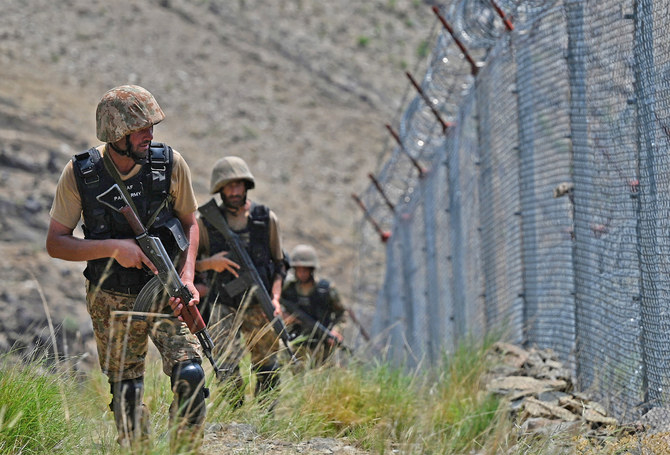
- With the Afghanistan Taliban back in control in Kabul, Pakistan is trying to quell a TTP comeback
- Prime Minister Khan announced in October that the government was in talks with the TTP for the first time since 2014
Pakistan PM to attend WEF meeting in Riyadh from April 28-29 — foreign office
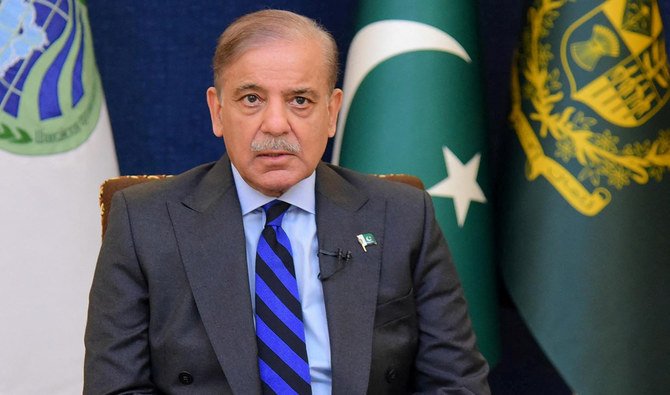
- PM Sharif is expected to discuss inclusive growth, regional collaboration and energy issues at the gathering
- He will also attend the Islamic Summit Conference in Gambia on May 4 to discuss Islamophobia and Palestine
ISLAMABAD: Prime Minister Shehbaz Sharif is scheduled to visit Saudi Arabia on the invitation of Crown Prince Mohammed bin Salman to attend a two-day World Economic Forum (WEF) meeting in Riyadh starting April 28, the foreign office of Pakistan said on Friday.
The two countries share cordial relations and have witnessed high-level official exchanges in recent years to further consolidate their ties, with Saudi foreign minister Prince Faisal bin Farhan visiting Pakistan earlier this month to discuss a spectrum of issues with the administration in Islamabad.
Prior to that, the Pakistani prime minister met the Saudi crown prince in Makkah to discuss the kingdom’s commitment to expedite its investments worth $5 billion.
“Prime Minister Muhammad Shehbaz Sharif and Foreign Minister Mohammad Ishaq Dar will attend the World Economic Forum Special Meeting on Global Collaboration, Growth and Energy to be held in Riyadh, Kingdom of Saudi Arabia, from 28-29 April 2024,” foreign office spokesperson, Mumtaz Zahra Baloch, said during her weekly media briefing.
“They have received the invitations from HRH Muhammad bin Salman bin Abdulaziz Al-Saud, Crown Prince and Prime Minister of the Kingdom of Saudi Arabia and Professor Klaus Schwab, the Founder and Executive Chairman of the World Economic Forum,” she continued.
Baloch said the occasion would allow the Pakistani delegation to interact with foreign leaders and heads of international organizations.
“The high-level participation in the Forum will afford an important opportunity to present Pakistan’s priorities specifically in global health architecture, inclusive growth, revitalizing regional collaboration and the need for striking a balance between promoting growth and energy consumption,” she added.
The prime minister will also attend the 15th session of the Islamic Summit Conference organized by the OIC on May 4-5 in the Gambian capital of Banjul to discuss a variety of regional and global issues, including Palestine, Islamophobia, climate change and the status of minorities, state-run APP reported.
The session will be held under the slogan “Enhancing Unity and Solidarity through Dialogue for Sustainable Development,” according to a press release issued by the OIC General Secretariat.
The Islamic Summit Conference attended by Sharif will be preceded by a preparatory meeting of senior officials on April 30 and May 1, who will discuss the documents of the session and submit a report to a preparatory meeting of the Council of Foreign Ministers (CFM).
“The preparatory CFM meeting will be held on May 1-2 to consider the results of the senior officials meeting and in turn, submit its report to the Summit,” the OIC said.
“Leaders of the member states will discuss the political issues of the Islamic world, most notably the Palestinian cause, and the economic, humanitarian, social and cultural issues, in addition to the issues of youth, women, family, science and technology, information, Muslim communities and minorities in non-OIC member states, and legal matters,” the OIC said.
The Summit will also tackle issues related to hate speech and Islamophobia, the promotion of dialogue, climate change and food security.
“The 15th session will issue a final communique that includes the OIC positions on the issues submitted to the Summit, a resolution on Palestine and Al-Quds Al-Sharif, and the Banjul Declaration,” the OIC added.
The Islamic Summit is a principal organ of the OIC focused on the formulation, development, and implementation of decisions made by 57 member states. The Summit is attended by concerned heads of state such as prime ministers, presidents, emirs and other equivalent heads.
Demand for solar power rises in Pakistan as import glut crashes panel prices
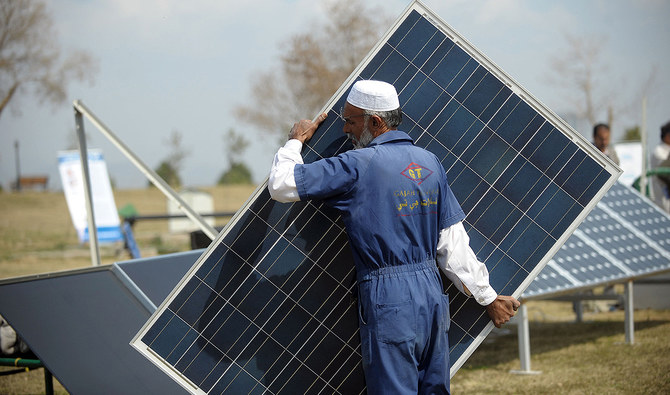
- Businessmen say solar panel prices have dropped by over sixty percent due to bulk import, rate cuts by China
- Islamabad currently only generates around five percent of its energy from renewable solutions like solar power
ISLAMABAD: The price of solar panels has plummeted by over sixty percent in Pakistan in recent weeks due to bulk imports from China because of lower rates, importers said this week, with more consumers switching to the renewable source of power to reduce electricity bills.
The cost of producing solar panels in China, which accounts for about 80 percent of global consumption, plummeted by 42 percent in the last year, giving manufacturers there an enormous advantage over rivals in places like the United States and Europe. Multiple European solar manufacturers have announced plans to close factories in recent months, under price pressure from Chinese imports. China accounts for 80 percent of solar module production capacity after years of subsidies.
Pakistan has ideal climatic conditions for solar power generation, with over nine hours of sunlight in most parts of the country. Utilizing just 0.071 percent of the country’s area for solar photovoltaic (solar PV) power generation would meet Pakistan’s electricity demand, according to the World Bank.
But currently, only 5.4 percent of Pakistan’s installed power generation capacity of 39,772 megawatts comes from renewables like wind, solar and biomass, while fossil fuels still make up 63 percent of the fuel mix, followed by hydropower at 25 percent, according to the National Electric Power Regulatory Authority (NEPRA).
But this may change with an acute drop in the price of panels, importers said.
“A solar plate of 580 watts that I bought [last year] for 75,000 rupees [$270] has dropped to 25,000 rupees [$90] now,” Muhammad Yahya, a solar importer in Islamabad, told Arab News on Thursday. “That means it’s one-third of [earlier price].”
“The rates of the inverters are the same and keep fluctuating, but the main thing is solar panels and the rates of the solar panels are now 33 percent lower.”
Prices of solar panels dropped in China following import curtailment from major buyers including India, US and Europe while the Pakistani government had abolished a 17 percent sales tax to encourage solar imports, Yahya said, explaining the reduction in panel prices:
“People who would import through illegal channels, they [the government] blocked them, this helped stop the illegal import, and led to a bulk import, and secondly the rates [of solar panels] have dropped in China.”
Another solar panel importer in Islamabad, Abdul Moiz, agreed that the rate drop in China and curtailment of imports to India and other major buyers had led to bulk imports to Pakistan.
“America and India have stopped their imports [from China], that’s why the majority of the imports are now directed toward Pakistan,” Moiz told Arab News.
“CLIMATE CHANGE”
Despite the benefits, including to the environment of zero carbon emissions from solar panels, Pakistan is far behind in meeting its goal of shifting to 60 percent renewable energy by 2030 with 50 percent reduction in projected emissions.
Experts say procedural and bureaucratic delays in construction approvals and unattractive tariffs for selling power to the national grid coupled with a lack of political will and little government investment had blocked the progress of the solar industry in the past. For households, a big impediment, before the Chinese rate cuts, was the steep initial investment.
But that has changed, with electricity consumers describing the drop in solar panel prices as a ‘big relief’ in reducing their electricity bills.
“After its [solar panel] installation, our [electricity] cost has reduced to thirty percent,” Imran Ali Gul, a manager at a local hotel who has installed a 16kw system, told Arab News. “That’s why we preferred to get the solar system installed.”
Aamir Hussain, chairman Pakistan Alternative Energy Association, told Arab News Pakistanis purchased and installed solar panels of around 1800 megawatts last year, which was expected to jump to 3,000 megawatts this year due to the lower prices of the panels and increased customer demand.
“Pakistan will be spending over $3.5 billion [this year] on solar panels imports only as this doesn’t include import of batteries, inverters and other auxiliary items,” Hussain said. “Pakistan needs to follow consistent policies regarding renewable energy to meet its national and international obligations for the greenhouse gas emissions.”
Experts also said Pakistan, one of the most vulnerable nations to climate change impacts, needed to swiftly move to end its reliance on fossil fuels.
“There is no denying of the fact that climate change has wreaked havoc globally, so the studies suggest that in order to meet the global targets of reducing our temperature etc, in addition to transition of existing fossil fuel power plants, we should cap these fossils as well,” Manzoor Ahmed, a researcher at the Policy Research Institute for Equitable Development in Islamabad, told Arab News.
“So, given this roadmap, given our commitments in terms of net zero emissions or COP conferences where we agreed to meet global targets, we have no choice but to shift to renewables and we must do it.”
Pakistani driver bags first-ever top 4 finish at Dubai Nations Cup
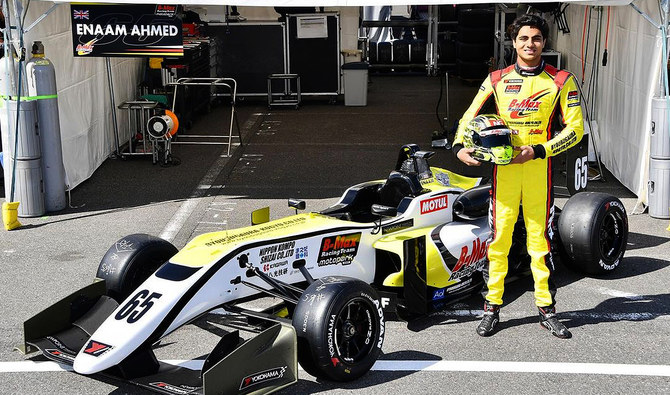
- Enaam Ahmed, 24, was born to Pakistani parents in London, started racing on Go-Kart tracks at age eight
- Ahmed became a British Formula Champion at 12 and a European and World Champion at the age of 14
ISLAMABAD: British-Pakistani racer Enaam Ahmed achieved a ground-breaking milestone this week by securing Pakistan’s first-ever top 4 finish at the Nations Cup in the Dubai 12-Hour Endurance Karting Race.
Ahmed, 24, was born to Pakistani parents in London where he started racing on Go-Kart tracks while he was eight. His passion grew with time, and he ultimately became the British Formula Champion at 12 and a European and World Champion at the age of 14. He is currently in the American Formula 3 league, before which he was car racing in the British Formula 3 and became a champion at 17.
For the Dubai tournament, Ahmed told Pakistan’s Geo News he chose the “two most talented drivers from Pakistan” to make team Pakistan, namely Maz Chughtai and Shamiq Saeed.
In the qualifying round, Pakistan managed to secure 2nd place in the Nations Cup and 4th overall against 30 of the best endurance teams from around the world. Team Pakistan then delivered a historic top-4 finish, but also won over archrivals India with an impressive 9-lap lead even after dropping to 30th place due to an unlucky puncture.
“It’s an honor to represent Pakistan and to achieve this milestone alongside my teammates,” he told reporters. “We worked tirelessly to make our country proud, and to also secure a commanding victory over India adds an extra layer of satisfaction to our accomplishment … This victory not only underscores Pakistan’s prowess in motorsports but also opens a new chapter whereby a new generation of drivers will be inspired.”
Speaking to Arab News in an interview in 2022, Ahmed said what inspired him was a desire to “change the way the world perceives our country [Pakistan] and the Muslim world, in terms of sports.”
“Representing the country [Pakistan] is what gives me the power, what gives me the motivation to succeed ... What keeps me going is this burning ambition to prove that we can be the best.”
While Ahmed has traveled and raced in some top teams and against some of the best drivers in the world, he also had to face racism initially as a rare person of color alongside the black British driver, Lewis Hamilton, who had inspired him to enter the profession in the first place. Ahmed has also found it difficult to find good sponsors, which he said was the reason he missed the chance of getting into Formula 2 in Europe.
“There were moments when I didn’t want to give up but it was looking like I would have to give up because there was no option,” he said. “There were some situations when I didn’t have a sponsor one week before a race, but I always found a way.”
Despite the odds, there has been no looking back for Ahmed, who has never lost a race and always finishes in the top three.
“I have always done things to be the best or nothing,” he said. “I don’t do things just to take part or come second or third. I am here to win.”
Speaking about his special connection with Pakistan, he said he was “put on this earth to race for Pakistan and become a champion.”
“I have two biggest motivations: One is to make my country proud and raise the flag of Pakistan the highest it has ever been, and to relieve my parents, my family of work.”
Ahmed is also on the Road to Indy series, a racecar driver development program that provided a scholarship-funded path to reach the IndyCar Series and Indianapolis 500.
Pakistan’s economic conditions improving, reforms and privatization on track — PM
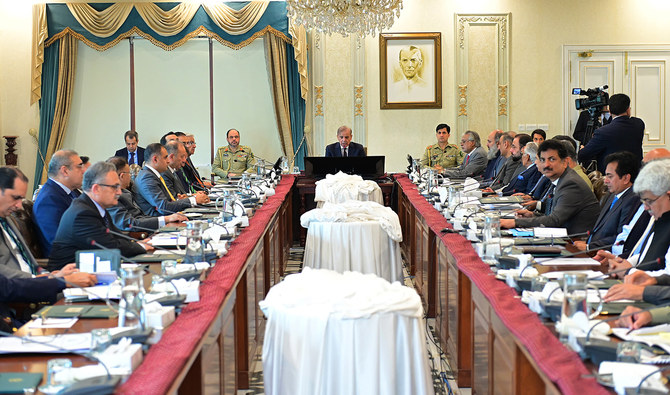
- Sharif says exports and remittances had shown a rise within one-and-a-half month of his government
- Pakistan’s finance ministry expects the economy to grow by 2.6 percent in the current fiscal year ending June
ISLAMABAD: Pakistan’s economic indicators are showing positive signs, with an agenda of painful reforms and privatization on track, Prime Minister Shehbaz Sharif said on Friday, ahead of an IMF board meeting to decide on a $1.1 billion funding for the country.
The prime minister said, in an address to his cabinet that was telecast live, that exports and remittances had shown a rise within one-and-a-half month of his government.
The IMF board is meeting on Monday to decide on the disbursement of the second and last tranche of a $3 billion standby arrangement Islamabad secured last summer to avert a sovereign default.
With a chronic balance of payment crisis, Pakistan needs $24 billion in payments for debt and interest servicing in the next fiscal year starting July 1 — three-time more than its central bank’s foreign currency reserves.
The South Asian nation is seeking yet another long-term, larger IMF loan. Pakistan’s Finance Minister, Muhammad Aurangzeb, has said Islamabad could secure a staff-level agreement on the new program by early July.
If successful, it would be the 24th IMF bailout for Pakistan.
The IMF-led structural reforms require Pakistan to raise its tax to GDP ratio from around 9 percent to at least 13 percent-14 percent, stop losses in state-owned enterprise and manage its energy sector losses which run into trillions of rupees.
“It is not just for an antibiotic to work anymore. It needs a surgery,” Sharif said.
Pakistan’s finance ministry expects the economy to grow by 2.6 percent in the current fiscal year ending June, while average inflation is projected to stand at 24 percent, down from 29.2 percent in fiscal year 2023/2024.
Inflation soared to a record high of 38 percent last May.
Pakistan joins call by UN for ‘credible investigation’ into mass graves discovery in Gaza
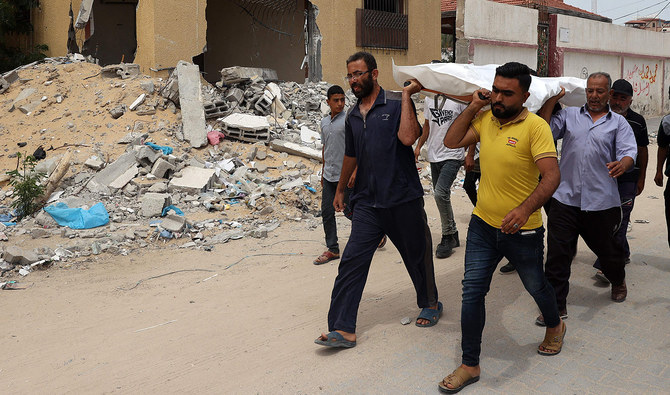
- Palestinian authorities say mass graves at Nasser and Al Shifa hospitals contain hundreds of bodies
- Pakistan says “independent and impartial investigation” must fix responsibility and punish perpetrators
ISLAMABAD: Pakistan said on Friday it joined the United Nations in calling for a “transparent and credible” investigation into the discovery of mass graves at two major hospitals in Gaza where over 34,000 Palestinians have been killed by Israeli attacks since October.
The discovery of the mass graves, said by Palestinian authorities to contain hundreds of bodies, have triggered calls by the UN rights chief and others for an international investigation. While not defined under international law, a mass grave is a burial site containing multiple bodies, the existence of which could be important in detecting possible war crimes.
Palestinian authorities said a grave site discovered at the Nasser hospital, the main medical facility in central Gaza, contained nearly 400 bodies. It was uncovered after Israeli troops pulled out of the city of Khan Younis.
Another grave site was also found by Palestinian authorities at the Al Shifa hospital in northern Gaza, which had been targeted by an Israeli special forces operation.
“Pakistan joins the call by the United Nations for a clear, transparent and credible investigation of mass graves and the massacre of men, women and children by the Israeli occupation forces,” the foreign office spokesperson said at a weekly briefing in Islamabad.
“An independent and impartial investigation must be held to ascertain the facts, fix responsibility and punish the perpetrators of war crimes and crimes against humanity in Gaza.
“We urge the international community, especially the backers of Israel to take urgent measures to bring an end to the war on the people of Gaza, lift the siege, protect civilians, facilitate humanitarian assistance and to hold to account the perpetrator of Gaza genocide.”
Currently, the International Criminal Court in The Hague has an active investigation into the attacks on Israel on Oct. 7 by Hamas and the response by the Israeli military.
The office of the prosecutor has jurisdiction in the Palestinian territories, but has not made any public comments about the discovery of mass graves.
Under the 1949 Geneva Conventions, to which Israel is a signatory, parties to a conflict must take all possible measures to prevent the dead from “being despoiled.” Customary international humanitarian law (IHL) calls for the dead to be respected, including a duty to prevent despoiling of graves and ensuring the identification and proper burial of human remains.
IHL also prohibits mutilation, desecration and other forms of disrespect toward the dead, while parties should take measures to protect grave sites, including those containing multiple human remains.
In 2002, in a case related to killings of Palestinians in the Jenin refugee camp in the West Bank, Israel’s Supreme Court ruled that the Israeli Defense Ministry was responsible under international law “for the location, identification, evacuation, and burial of the bodies” of Palestinians killed in fighting. The judges said bodies should not be buried in mass graves but handed over to the Palestinian authorities.
The International Criminal Court’s founding Rome Statute defines the desecration or mutilation of dead bodies as a war crime and this is banned as an outrage upon personal dignity.
Allegations by Palestinian authorities that the Israeli Defense Forces (IDF) had buried the bodies were “baseless and unfounded,” the IDF said in a statement. The graves were dug by Palestinians, it said, releasing footage showing the graves pre-dated IDF operations.
IDF forces searching for Israeli hostages had examined bodies buried near Nasser hospital and then returned them, the IDF said.
“The examination was carried out respectfully while maintaining the dignity of the deceased,” it said.
With inputs from Reuters










